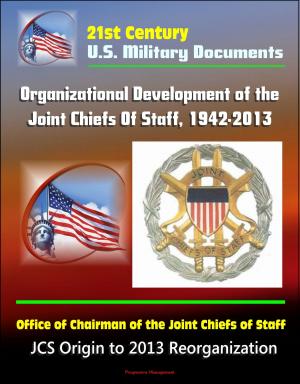21st Century Peacekeeping and Stability Operations Institute (PKSOI) Papers - The Government Assistance Center: A Vehicle for Transitioning to the Host Government
Nonfiction, History, Military, United States| Author: | Progressive Management | ISBN: | 9781311877901 |
| Publisher: | Progressive Management | Publication: | November 25, 2013 |
| Imprint: | Smashwords Edition | Language: | English |
| Author: | Progressive Management |
| ISBN: | 9781311877901 |
| Publisher: | Progressive Management |
| Publication: | November 25, 2013 |
| Imprint: | Smashwords Edition |
| Language: | English |
From the foreword: Policy-makers and strategists have long recognized that complexity and chaos are common features of the strategic environment, which encompasses both the international and domestic realms. In war, the military seeks to mitigate these features through superb organization and staff-work, among other pursuits. Unfortunately, outside of the military, this same discipline is not applied to other endeavors, such as Security Sector Reform, Disaster Response, and Humanitarian Assistance.
In this monograph, Professor Raymond Millen proposes a way for non-military organizations to render assistance and development to fragile states through an organizational approach. Accordingly, he proffers the concept of the Government Assistance Center as a vehicle for effective coordination and cooperation in Whole of Government and Comprehensive approaches. Conceptually, the Government Assistance Center embodies a standardized camp and an organizational structure for decision-making.
The standardized camp has an expeditionary capability, using state-of-the-art barrier and shelter systems. Standardized camps permit diverse organizations and agencies to interface with one another as well as with the host government in an orderly manner. In this sense, it epitomizes the government-in-a-box concept. Due to their standardized design, Government Assistance Centers have the same capabilities regardless of the contributing nations and organizations involved. Their expeditionary character permits Government Assistance Centers to deploy into remote countries and become operational within days. Moreover, Centers may re-locate within a country quickly, adapting to dynamic changes.
The most interesting feature of the Government Assistance Center is the integrated decision-making apparatus. This unique capability permits the formulation of policy and strategy to occur within the host nation, leading to more practical and germane solutions to national and local issues. The integrated nature of the apparatus encourages cooperation and coordination of participating organizations and agencies, injecting their expertise on issues which concern them. In praxis, this is smart power to the nth degree.
Professor Millen concludes his study with points for consideration regarding prevalent issues which confront practitioners, and he briefly discusses how the UN might place Government Assistance Centers into practice. Ultimately, the monograph provides a way for Whole of Government and the Comprehensive approaches to succeed without excessive dependency on the U.S. Army's skill sets.
The Peacekeeping and Stability Operations Institute is pleased to offer this monograph as a topic of consideration and debate among the government and international communities.
From the foreword: Policy-makers and strategists have long recognized that complexity and chaos are common features of the strategic environment, which encompasses both the international and domestic realms. In war, the military seeks to mitigate these features through superb organization and staff-work, among other pursuits. Unfortunately, outside of the military, this same discipline is not applied to other endeavors, such as Security Sector Reform, Disaster Response, and Humanitarian Assistance.
In this monograph, Professor Raymond Millen proposes a way for non-military organizations to render assistance and development to fragile states through an organizational approach. Accordingly, he proffers the concept of the Government Assistance Center as a vehicle for effective coordination and cooperation in Whole of Government and Comprehensive approaches. Conceptually, the Government Assistance Center embodies a standardized camp and an organizational structure for decision-making.
The standardized camp has an expeditionary capability, using state-of-the-art barrier and shelter systems. Standardized camps permit diverse organizations and agencies to interface with one another as well as with the host government in an orderly manner. In this sense, it epitomizes the government-in-a-box concept. Due to their standardized design, Government Assistance Centers have the same capabilities regardless of the contributing nations and organizations involved. Their expeditionary character permits Government Assistance Centers to deploy into remote countries and become operational within days. Moreover, Centers may re-locate within a country quickly, adapting to dynamic changes.
The most interesting feature of the Government Assistance Center is the integrated decision-making apparatus. This unique capability permits the formulation of policy and strategy to occur within the host nation, leading to more practical and germane solutions to national and local issues. The integrated nature of the apparatus encourages cooperation and coordination of participating organizations and agencies, injecting their expertise on issues which concern them. In praxis, this is smart power to the nth degree.
Professor Millen concludes his study with points for consideration regarding prevalent issues which confront practitioners, and he briefly discusses how the UN might place Government Assistance Centers into practice. Ultimately, the monograph provides a way for Whole of Government and the Comprehensive approaches to succeed without excessive dependency on the U.S. Army's skill sets.
The Peacekeeping and Stability Operations Institute is pleased to offer this monograph as a topic of consideration and debate among the government and international communities.















